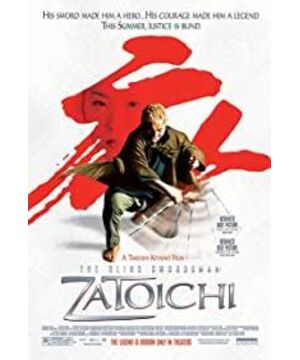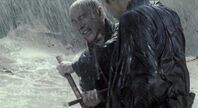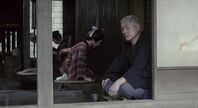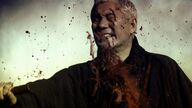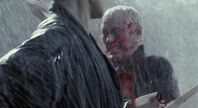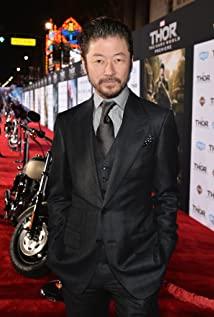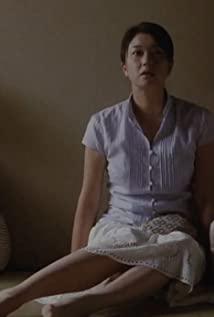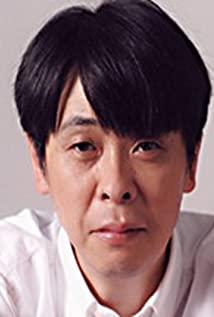Martial arts films have been my favorite since I was a child, perhaps because of the difference in cultural background, the two masters of Chinese martial arts films always fight for a long time, from morning to night, from no snow to snow (Xiao Zhang's "Ten Faces") ambush"). I am deeply immersed in the kind of endless martial arts films.
Japanese martial arts films have traces of Chineseization in culture, but they are very local in terms of creative techniques. For "Zatoichi",
Takeshi Kitano pays attention to the justice and sharpness of the sword in fighting: one is In the enemy's yard, the two sisters were forced to the door. Everyone thought they must fall into the clutches. Suddenly, a blind man's knife appeared from the crack of the door. Watching the door latch was slowly picked off, everyone knew that the two sisters were saved. Justice will be stretched. The second is when he was fighting with Boss Hei's subordinates, Zatoichi stabbed one, and two scenes focused on the sharpness of the knife. One was to chop off the stone tower placed in the courtyard together with the opponent; After Toichi was deliberately overwhelmed by the paper door, the opponent fell on the paper door, and Zatoichi's knife stabbed upward from the opponent. Not only that, the knife also cut on the opponent in the direction of the blade, which made me suspect Kitano. Whether Wu was a woodworker before, the scene felt like a triangle on a cutting machine. Kitano deliberately made such scenes of our daily life to be sublimated in her film of using violence to control violence.
In fighting, on the premise of paying attention to the speed of the knife, it also pays attention to the empathy of the masters before the game. Ginzo once asked Zatoichi if he was sure of winning Gennosuke Hattori, and Zatoichi asked back if he had a better chance of winning in the dark? (This sentence was asked why he pretended to be blind before the second black boss was killed, and he said: Blind people can better perceive the world. This sentence explains it, and also explains the final fall of the film. The sentence he said set the stage.) When Gennosuke and the blind man faced each other in the duel, his head flashed the trajectory of the opponent's shot, and he made a slight smile on his face, thinking he won, but unexpectedly However, Shi changed the gesture of holding the knife when he shot, and changed the backhand to the forehand, which shortened the distance of attacking the opponent's part and gained time (because I am stupid, I have read this paragraph several times). After all, ginger is still old and spicy. In fact, Gennosuke's sword skills should be on par with Zatoichi. If you keep your eyes open, Zatoichi may not be able to win. It can be seen from his dialogue with Ginzo that he still has concerns about his opponent. But Kitano Takeshi deserves to be Kitano Takeshi. He arranged for the meeting between Gennosuke and Zatoichi in only two places, one is the hotel, and the other is the riverside. In the hotel, Gennosuke saw the weapon that Zatoichi dropped from the blind battle and had the first fight. Although the two sides did not shoot the sword, the gesture of Zatoichi drawing the sword left an impression on Gennosuke. The deadly thoughts before his death leave a foreshadowing. In fact, Kitano Takeshi is also telling young people through this: Don't ignore the elderly, they often have many precious wealth!
"Zatoichi" is an inexhaustible and rare good film that has had a profound impact on the world in recent years. There are still many good places to discuss it. Of course, no matter how good a film is, there are always shortcomings. Here Not to mention.
In contrast, domestic martial arts films (referring to mainland China) in the past 20 years can be remembered in terms of market, shooting techniques, art, and thinking?
The author is blunt, and so far, the only one I think is better is He Ping's "Double Flag Town Swordsman". Although He Ping never admits that this is a martial arts film and thinks it is a children's film, he leaves a deep impression in terms of technique, artistic handling, and ideological connotation. Especially at the end of the film, after waiting for a long time for a sword to come, and when several old men in Shuangqi Town died of scars in order to protect the boy, the boy was forced to a dead end and was forced out of anger. , At this time, the duel with Scar is no longer for the sake of protecting himself, but for the folks in Shuangqi Town. The boy has the courage and strength. This courage and strength has driven a gust of wind, like the roaring power of the Yellow River in the northwest. It is also a few moments of work. He Ping uses the unique subtlety of Chinese intellectuals to tell people: Don't ignore the power of the weak! At the end of the film, a knife fairy picks up his knife and runs away after Scar is killed, and I don't know how many people are going to be deceived, which is ironic. This reminds me of many migrant workers who could not get their wages when the Chinese New Year was approaching. Under the pressure of long-term unpaid wages from the contractors, they finally joined forces to obtain wages through various channels. Who would have thought how many there are How can people be deceived by such a sword fairy? !
This film was shot by He Ping at the Western Film Studio when he was in desperation. Did he also tell the upper management of the Western Film Studio, who said that I couldn't make good works if He Ping couldn't do it? ! In fact, the second film later won many awards internationally and was praised by many domestic fans. Since then, many leaders of the Western Film Studio have dared not to underestimate He Ping.
Let’s take a look at Xiao Zhang, who is very well-known in our country. To be honest, I still agree with Xiao Zhang shooting martial arts films, because he has already satisfied the market. In terms of box office, how many people in China dare to win this spot with him? The shooting techniques and artistic senses are first-class, fully discounting Xiao Zhang's aesthetic thoughts, and also let us appreciate the great rivers and mountains of the motherland (there is also a hobby of Zhang Jizhong, who is filming TV series, and these two pictures have also driven China's tourism market. , to make the author’s work more sustainable) It’s just that the ideological connotation needs to be improved, and many people criticize Xiao Zhang badly. I don’t agree. It is very unusual for Xiao Zhang to make martial arts films like this when the domestic martial arts film market is so sluggish. It's easy, let's ask: now besides him, who else can I find that? Therefore, Xiao Zhang is a national treasure, not only can't be attacked, but also protected.
So why are domestic martial arts films so sluggish? The author thinks that it is caused by the existing system in China. In the old film studios in China, there used to be a rigid system. Any film must conform to the ideology of those old directors. Some directors with ideas and originality have to go through five hurdles in order to express themselves. You have to meet someone with a gray nose and a gray face. In one sentence: If you don't conform to the old director's idea, you can't do it. If you can't, you won't have the money to shoot. As a result, a large number of talented young directors have been stifled. You can see it when you have time to watch He Ping talk about his predicament before filming "Double Flag Town Swordsman".
I think it would be bad if Xu Ke, the Hong Kong director of his time, was in mainland China.
Fortunately, Xiao Xu is not there. coursing.
View more about The Blind Swordsman: Zatoichi reviews


